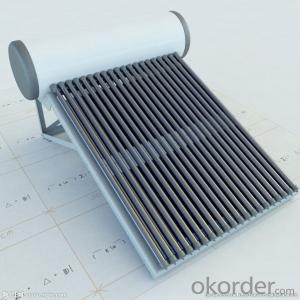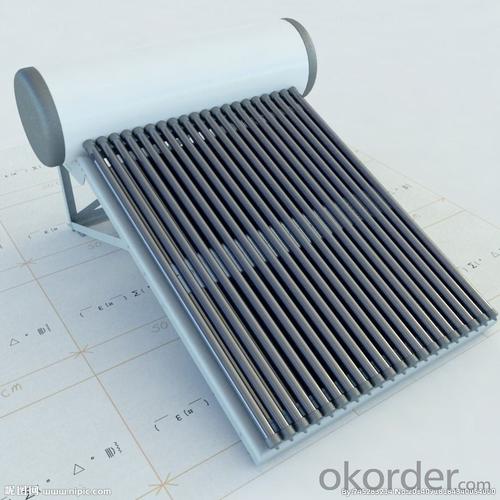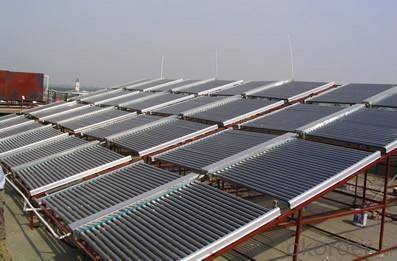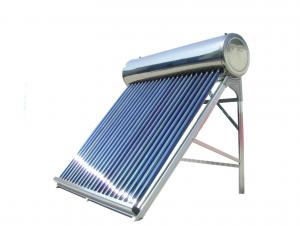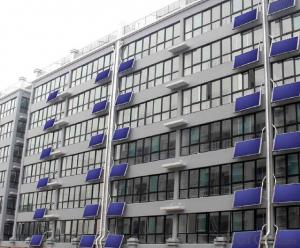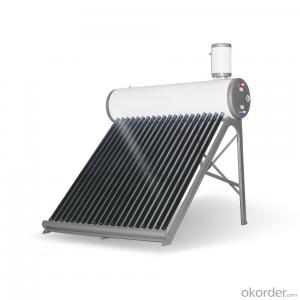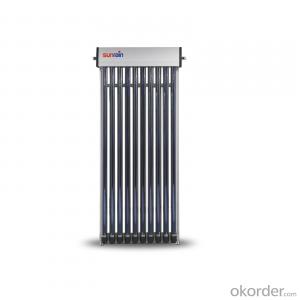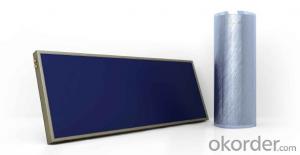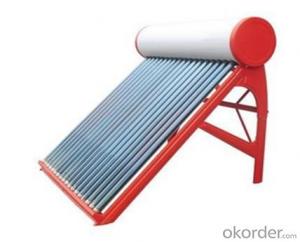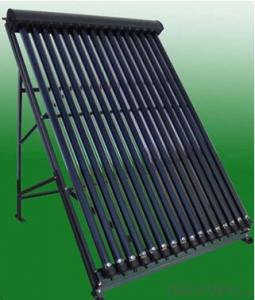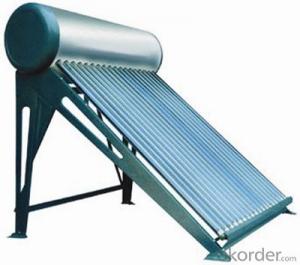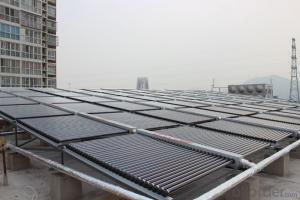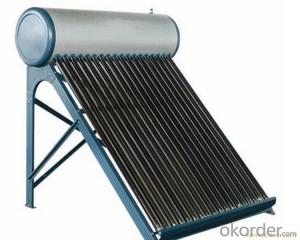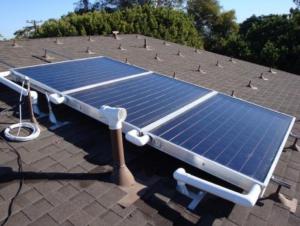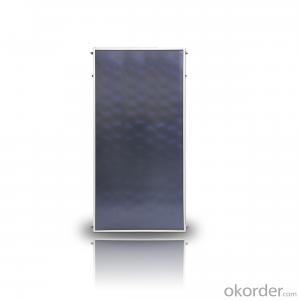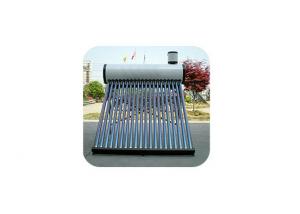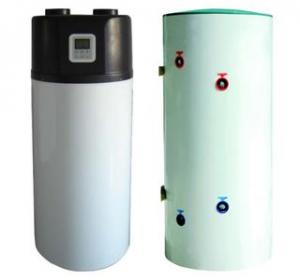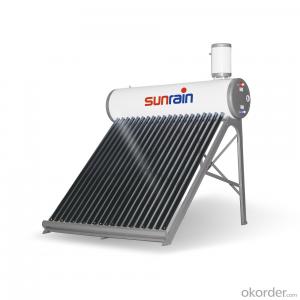110L Solar Water Heater Water Tank with Assistant Tank
- Loading Port:
- China main port
- Payment Terms:
- TT OR LC
- Min Order Qty:
- 10 set
- Supply Capability:
- 5000 set/month
OKorder Service Pledge
OKorder Financial Service
You Might Also Like
Working Principle of Domestic Solar Water Heaters:
Solar energy, in essence, is an electromagnetic wave, a type of strong optical radiation, which is produced by thermonuclear fusion reaction. The energy of the solar radiation is transmitted through the liught of different wave length. The solar water heater is designed to mainly take in the energy of visible light & near ultra red light through the selective absorbing coating of vacuum tubes.When the water in the solar collector is heated by the solar radiation, its temperature rises. As a result, the water in the solar collector and the water in the tank form natural convection because of density contrast casued by the temperature difference. So the water of the higher temperature is incessantly forced into the insulated solar water tank( As shown in the figure).
Features
<1> Imported SUS304-2B food-level stainless steel,thickness:0.31~0.5mm
<2> Outer tank: High quality stainless steel,thickness:0.31~0.5mm
<3>Insulation: 50~55mm polyurethane foam
<4> Vacuum tube: CU/SS-AL/N red tube
<5> Frame: Stainless steel/Aluminum alloy,thickness:1.2~2mm
<6> Reflector: Stainless steel/Aluminum alloy as option
<7> Available accessories: Feeding tank,solar controller,electric heater, Mag rod,thermostatic mixing valve
Specification
ITEM.NO | SPECIFICATION | EFFECTIVE LIGHT AREA | TANK'S CAPACITY | APPLICATION PEOPLE | CBM | |||
DIAMETER OF WATER TANK | QTY OF TUBE(pcs) | DIAMETER OF TUBE | LENGTH OF TUBE | |||||
Z-NS5810 | 460mm | 10 | 58mm | 1.8m | 1.04 | 100L | 4 | 0.37 |
Z-NS5812 | 460mm | 12 | 58mm | 1.8m | 1.25 | 120L | 4-5 | 0.44 |
Z-NS5815 | 460mm | 15 | 58mm | 1.8m | 1.56 | 150L | 6 | 0.56 |
Z-NS5818 | 460mm | 18 | 58mm | 1.8m | 1.87 | 180L | 7-8 | 0.64 |
Z-NS5820 | 460mm | 20 | 58mm | 1.8m | 2.08 | 200L | 8 | 0.7 |
Z-NS5825 | 460mm | 25 | 58mm | 1.8m | 2.61 | 250L | 10 | 0.89 |
Z-NS5830 | 460mm | 30 | 58mm | 1.8m | 3.13 | 300L | 12 | 1 |
Z-NS5836 | 460mm | 36 | 58mm | 1.8m | 3.75 | 360L | 14-15 | 1.3 |
Z-NS5840 | 460mm | 40 | 58mm | 1.8m | 4.17 | 400L | 16 | 1.4 |
Z-NS5845 | 460mm | 45 | 58mm | 1.8m | 4.69 | 450L | 18 | 1.6 |
Product Details Show:
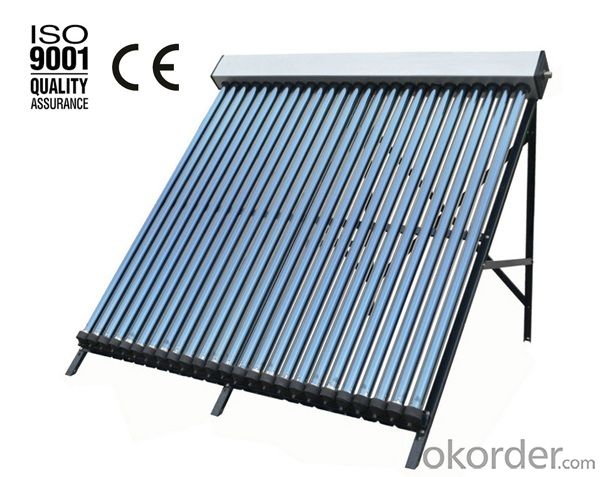
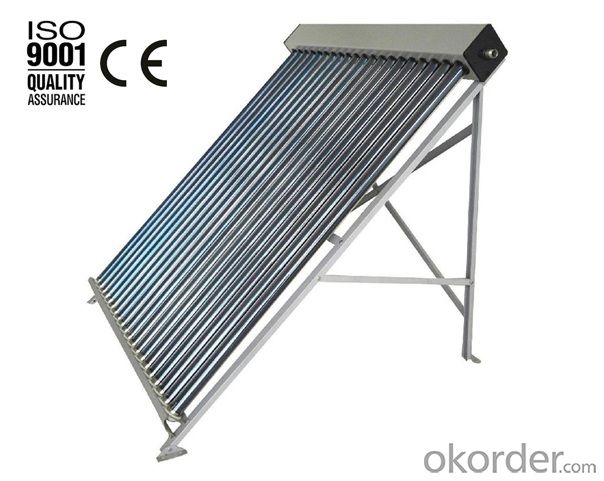
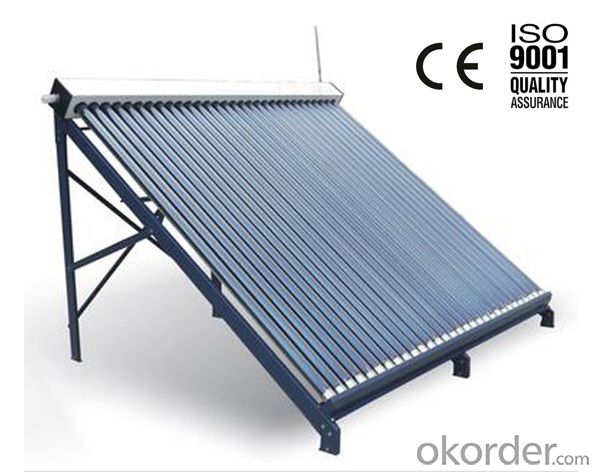
FAQ
1. Q: Are you a factory or trading company?
A: We are a factory. Especially for Solar Controller, PWM solar controller 50A12V/24V
2. Q: Where is your factory located? How can I visit there?
A: Our factory is located in Guangzhou, China. You are warmly welcomed to visit us!
3. Q: what other product you have except such Solar Lighting?
A: We have poly ,mono cells and panels. Off grid solar system, like off grid solar inverter, pure sine wave inverter, solar collector, solar controller, solar charger, Portal solar system, battery, DC Fan, Solar Led Light.
4. Q: Can the price be cheaper?
A: Of course, you will be offered a good discount for big amount.
5. How can I get a sample?
A: Please call us or send email for asking the samples.
- Q: Can a solar water heater be used in areas with high levels of noise pollution from industrial sources?
- Yes, a solar water heater can be used in areas with high levels of noise pollution from industrial sources. The operation of a solar water heater does not depend on or get affected by noise pollution. It solely relies on harnessing the sun's energy to heat water, making it suitable and effective in any environment, regardless of noise levels.
- Q: Can a solar water heater be used in areas with restrictions on rooftop installations?
- In areas with restrictions on rooftop installations, a solar water heater can still be utilized. Although rooftop installations are typically the most common and efficient method for harnessing solar energy for water heating, there are other viable options available. One possibility is to install the solar water heater on the ground, either in the backyard or any suitable open space. To accomplish this, a rack or stand specifically designed for solar water heaters can be used. Another option is to install the solar water heater on a wall or a freestanding structure, such as a shed or a carport. These alternative installations may necessitate additional equipment and adjustments, but they can effectively utilize solar energy to heat water while adhering to any restrictions on rooftop installations. It is crucial to consult with a professional installer to determine the most suitable alternative installation option based on specific restrictions and conditions.
- Q: How does the size of a storage tank affect the performance of a solar water heater?
- The size of a storage tank can directly affect the performance of a solar water heater. A larger storage tank allows for more hot water to be stored, providing a greater supply of hot water for longer durations. On the other hand, a smaller storage tank may result in limited hot water availability, especially during periods of high demand. Therefore, choosing an appropriate size for the storage tank is crucial in ensuring efficient and satisfactory performance of a solar water heater.
- Q: Can a solar water heater be used in areas with limited access to hot water storage tanks?
- Yes, a solar water heater can be used in areas with limited access to hot water storage tanks. In such cases, alternative methods can be employed to store and distribute hot water generated by the solar water heater, such as using smaller individual storage tanks or implementing a direct circulation system where the heated water is immediately distributed to the desired location without the need for a storage tank.
- Q: How does a solar water heater contribute to reducing carbon emissions?
- A solar water heater reduces carbon emissions by utilizing the sun's energy to heat water, eliminating the need for traditional fossil fuel-based heating methods. This renewable energy source significantly reduces the reliance on non-renewable energy sources, such as coal or natural gas, which release carbon dioxide when burned. By using solar power, a solar water heater helps to mitigate greenhouse gas emissions and contributes to a cleaner and more sustainable environment.
- Q: Are there any tax credits available for installing a solar water heater?
- Yes, there are tax credits available for installing a solar water heater. The federal government provides a solar investment tax credit (ITC) of up to 26% of the cost of the system, including installation. Additionally, some states and local governments may offer additional incentives or tax credits for installing solar water heaters.
- Q: Can a solar water heater be installed by a homeowner or does it require professional installation?
- While it is possible for a homeowner to install a solar water heater, it is generally advised to seek professional installation. Although the installation process of a solar water heater is not excessively complicated, it still entails dealing with plumbing, electrical connections, and potentially making structural modifications. By opting for professional installation, you can guarantee that the installation is carried out correctly and in accordance with local building codes and regulations. Moreover, professionals possess the expertise and experience to determine the optimal installation location and make any required adjustments or repairs. Consequently, this will lead to a more efficient and effective solar water heating system. However, if you possess a solid understanding of plumbing and electrical work and feel confident in your abilities, you may opt to install a solar water heater on your own. In such a case, it is crucial to thoroughly research and adhere to the manufacturer's instructions, as well as consult with local authorities to ensure compliance with any necessary permits or regulations.
- Q: Can a solar water heater be used in areas with limited access to tidal power?
- In areas where tidal power is limited, a solar water heater can be used instead. Tidal power generates energy from ocean tides, while a solar water heater uses the sun's energy to heat water. These two energy sources are independent and can be used separately. Solar water heaters are a sustainable and renewable technology that can be installed in any area with sufficient sunlight. They capture the sun's energy through solar panels or collectors, which heat the water in a storage tank. This heated water can be used for bathing, cooking, or space heating. Therefore, even in areas without access to tidal power, solar water heaters are an excellent alternative. They provide hot water, reduce reliance on fossil fuels, and lower energy costs. They are particularly beneficial in remote or off-grid locations where electricity supply may be limited or unreliable. In conclusion, while certain areas may not have tidal power, solar water heaters offer a viable and environmentally friendly solution for hot water needs.
- Q: How does a solar water heater affect water heater installation time?
- A solar water heater can significantly reduce the installation time of a traditional water heater. Since solar water heaters use the energy from the sun to heat water, they don't require complicated plumbing or electrical connections, which simplifies the installation process. Additionally, solar water heaters are often pre-assembled and come with detailed installation instructions, making it easier and quicker for professionals to install them compared to conventional water heaters.
- Q: How does the type of heat transfer fluid impact the performance of a solar water heater?
- The type of heat transfer fluid used in a solar water heater plays a crucial role in its overall performance. The fluid is responsible for absorbing heat from the solar collectors and transferring it to the water storage tank. The choice of heat transfer fluid impacts the efficiency, reliability, and durability of the solar water heater. Some common types of heat transfer fluids include water, glycol-based solutions, and oils. Water is a commonly used and cost-effective heat transfer fluid. It has excellent thermal properties and high heat capacity, allowing it to efficiently absorb and transfer heat. However, water can freeze in cold temperatures, which can lead to system damage if not properly managed. Glycol-based solutions, such as propylene glycol, are often used in colder climates to prevent freezing. They have lower freezing points than water, ensuring the system's operation even in freezing temperatures. However, glycol solutions have lower heat capacity than water, resulting in slightly reduced efficiency. Oils, such as silicone oil, are another option for heat transfer fluids. They have higher heat capacity than water and better thermal stability at high temperatures. However, they can be more expensive and may require additional system components to handle the higher temperatures. Ultimately, the choice of heat transfer fluid should be based on factors such as climate, cost, and system requirements. Proper selection and maintenance of the fluid are crucial to ensure optimal performance and longevity of the solar water heater.
Send your message to us
110L Solar Water Heater Water Tank with Assistant Tank
- Loading Port:
- China main port
- Payment Terms:
- TT OR LC
- Min Order Qty:
- 10 set
- Supply Capability:
- 5000 set/month
OKorder Service Pledge
OKorder Financial Service
Similar products
Hot products
Hot Searches
Related keywords
